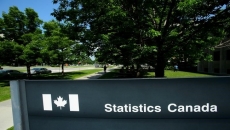Statistics Canada says the economy added 246,000 in August as the pace of job gains slowed compared with July, when 419,000 jobs were added.
The figure marked the fourth consecutive month of gains from COVID-19 related lockdowns this spring, bringing the number to within 1.1 million of pre-pandemic levels.
Gains in August were largely concentrated in full-time work, which had been lagging behind gains in part-time employment.
Full-time work rose by 206,000 while the number of part-time workers rose by 40,000.
Full-time employment is now almost six per cent away from pre-pandemic levels compared to the 3.9 per cent shortfall in part-time work.
Employment also rose at a faster pace for women than men for the third straight month as Statistics Canada reported women gained about 150,000 positions in August compared with 96,000 for men.
As well, the number of Canadians working less than half their usual hours — likely due to COVID-19 — fell by 14.6 per cent. That leaves some 713,000 workers still working fewer hours, down from the 2.5 million peak in April.
More Canadians headed into work instead of their home office, Statistics Canada says, noting that 300,000 fewer people worked from home while those working in other locations rose by almost 400,000.
The unemployment rate fell to 10.2 per cent in August compared with 10.9 per cent in July.
Economists were expecting a slightly higher gain of 275,000 jobs in August and an unemployment rate of 10.1 per cent, according to financial data firm Refinitiv.
Statistics Canada says the unemployment rate in August would have been 13 per cent had it included in calculations people who wanted a job, but didn't look for work.
The unemployment rate was higher for racialized workers than non-racialized workers.
Statistics Canada says the rate, not seasonally adjusted, for Arab workers was 17.9 per cent, followed by 17.6 per cent for Black workers, and then 16.6 per cent for those who identify as Southeast Asian.
The agency also says that employment among Indigenous people living off-reserve fell by 1.8 per cent from July, compared with gains of 1.3 per cent for non-Indigenous Canadians.
That left Indigenous people with an employment rate at 91.4 per cent of February levels, compared to 96.7 per cent for non-Indigenous Canadians, Statistics Canada says.






